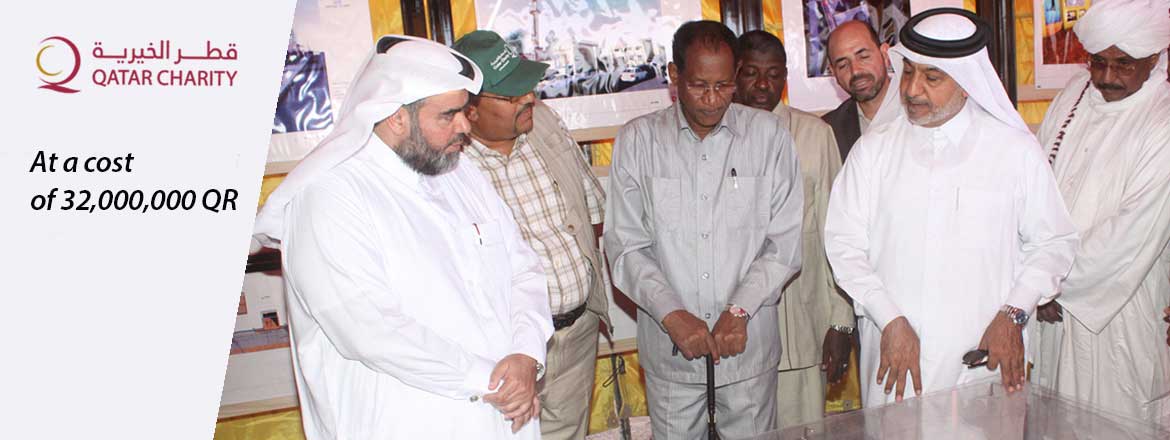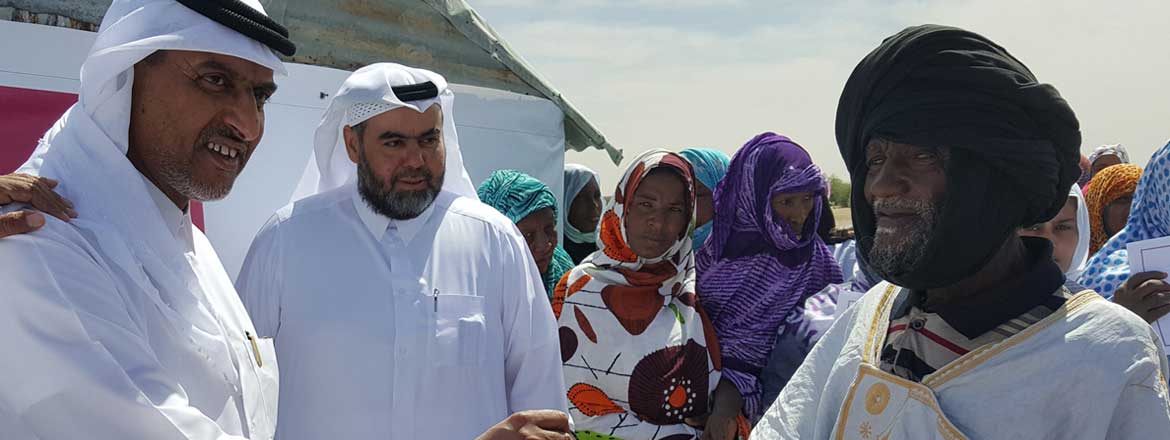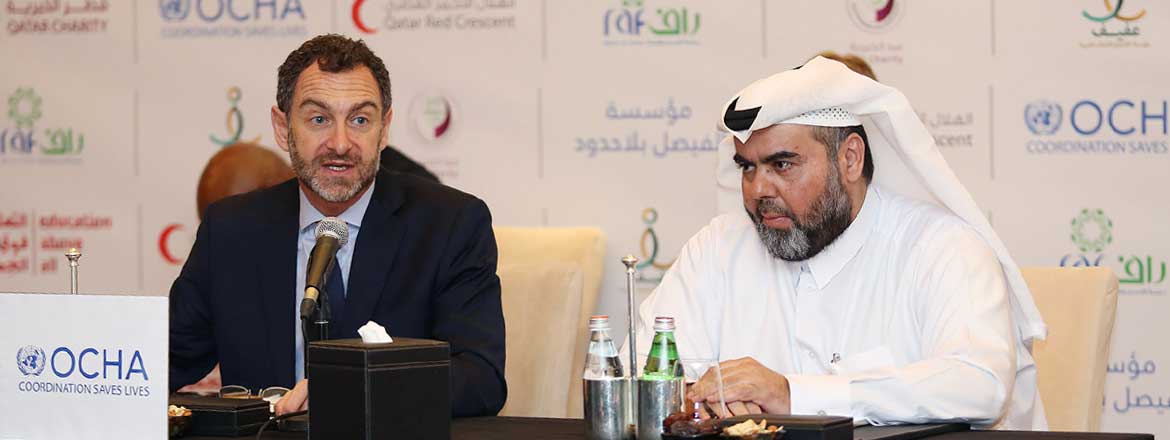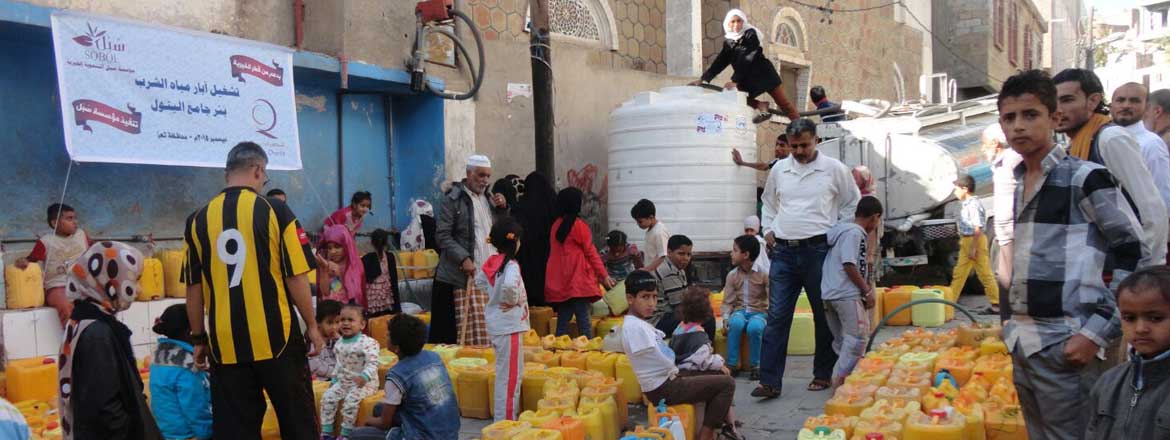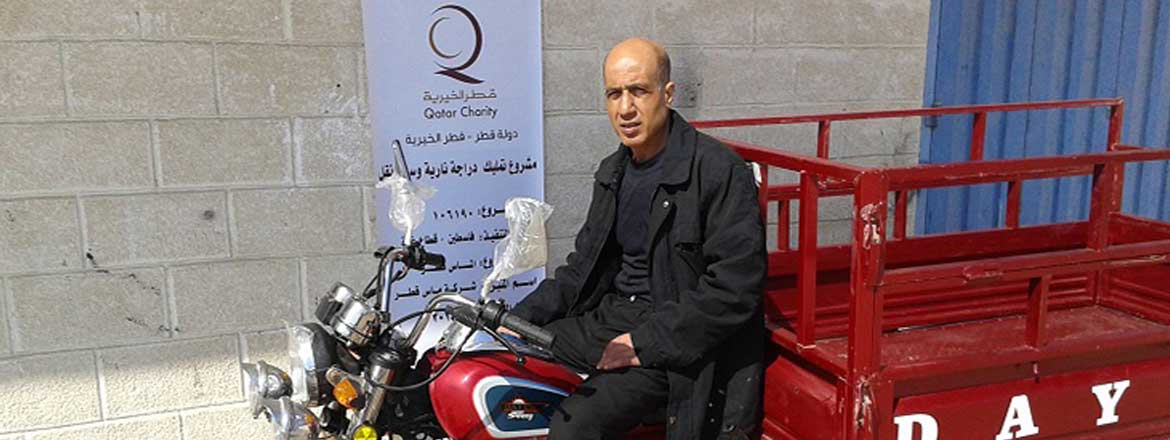QC Drills 70 Wells in Niger in 1 Year
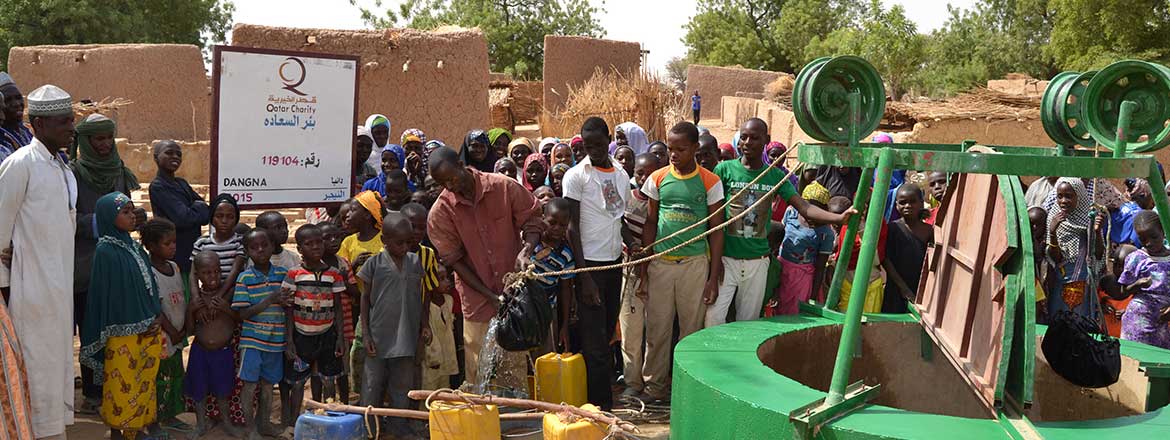
2016-03-06T03:08:23+01:00

Water projects are a priority in Niger because 50% of its people do not have clean water
QC's offices own water-well drillers in Somalia, Niger, Burkina Faso and Sudan, which reinforces their work in the water and sanitation sectors.
In 2015, QC was able to drill 70 wells in Niger through which it provided drinking water to 35,750 families and the cattle they own at a cost of around 2,500,000 QR.
The water in Niger, where the climate is dry, is considered one of the severest problems its inhabitants suffer from. 50 % of its people do not get drinking water. Therefore, water projects are a priority for Niger and other humanitarian organizations, including QC.
Great Needs
Mr. Mohammed Taher Al Sweibqi, QC's Office Director in Niger, said that the water projects QC implemented in Niger saved the lives of so many families. "QC's water projects provided drinking water for multiple regions where the total number of beneficiaries reached 35,750 families. The cattle the families own and the surrounding areas benefited as well," added he.
Mr. Al Sweibqi thanked the philanthropists and donors from Qatar who have been very generous with the donations they make. "Your donations help revive the cities where the wells are dug, where the rate of poverty reached 60%. The Nigerians' need for drinking water is still great, which is why more donations should be made," said he.
The drilled wells vary to include artesian aquifers and shallow wells; some wells are supplied with solar energy, others with electricity. These wells were drilled in several areas such as Zinder, Maradi, Tillabéri, and Dosso; the distances between these areas and Niamey differ and the farthest of some is 1,000 Km. Plus, 6 wells were drilled in Niamey, the Capital.
Teachers' Institutes
Some wells are drilled to meet the needs of the schools, institutes, and the surrounding areas. Mr. Al Sweibqi participated in the official opening ceremony of a training institute for the teachers in Niamey. He was accompanied by Aïssata Issoufou Mahamadou, the First Lady, the Minister of Education and a number of officials after QC had drilled a well supplied with solar energy at the same institute.
During the opening, Niger's Minister of Education said, "The artesian aquifer project QC implemented in the institute for training teachers came as a real solution to the water problem the institute and the people surrounding it used to suffer from. I sincerely thank QC for its efforts. It helped so many people overcome such a severe problem."
Private Drillers
QC's implementation of water projects was reinforced in the beginning of 2015 when the office bought a German driller to dig artesian aquifers. The driller was of high quality and specifications. It cost 1,500,000 QR. A training course was organized for the workers and the people responsible for the driller in order to reinforce QC's efforts in Niger. The driller contributed to the increase in the number of drilled wells QC is planning to dig in the following years, and it will also contribute to the reduction of costs.
It is worth noting that in 2014, QC drilled more than 45 different types of wells; some had manual pumps, some depended on electricity and others on solar energy. The total cost of the implementation of these wells was around 2,100,000 QR. The number of beneficiaries exceeded 35,600 people. In addition, the total number of drilled wells until the end of 2014 reached 264 at a total cost of more than 9,000,000 QR from which around 318,170 people benefited.
QC's offices own water-well drillers in Somalia, Niger, Burkina Faso and Sudan which reinforces their work in the water and sanitation sectors. Many wells were drilled using these drillers to secure drinking water for the beneficiaries.
You can donate to support such projects through the link: Click here
Related News
QC’s Delegation Visits Rofaqa
The village consists of 200 apartments, a kindergarten, 2 primary schools, 2 secondary schools, a training center, a medical clinic, a mosque, a market, two water plants and playgrounds for the children.
The village offers comprehensive services to 200 families of the orphans, and 5,000 people from the surrounding regions. It offers shelter, health, education, qualification, sports, and entertainment services.
The village’s work progress is fast. It is expected that it will be entirely established by the middle of next year.
Mohammed Hamed Al Billa, Wali River Nile in Sudan; and His Excellency Mr. Rashid bin Abdu ar-Rahman Al Na’imi, Qatar Ambassador in Sudan; were present during the inspection visit QC’s delegation paid to the village. The delegation was headed by Mr. Youssef bin Ahmed Al Kuwari whose visit was to review the work progress of Rofaqa Village for Orphans which QC had started establishing in River Nile state few months earlier at a cost of 32,000,000 QR.
‘Rofaqa Village’ is considered to be a comprehensive developmental environment which works on developing the orphans’ personalities. It has multiple facilities that offer basic services in the fields of shelter, health, education, qualification, sports and entertainment. The village is situated in Ad-Damar in Nile River state; 200 families of the orphans and 5,000 people from the surrounding regions benefit from it.
Facilities of the Village
The village consists of 200 apartments (for widowed mothers and their orphaned children), a kindergarten, 2 primary schools (one for boys and one for girls), 2 secondary schools (one for boys and one for girls), a training center, a medical clinic, a mosque which can receive 800 performers of prayer, 2 water plants (2 wells with tanks to provide the village with drinking water), playgrounds and fields. The inhabitants of nearby regions are expected to benefit from the services the village offers, as well.
The work on the village started this March (2015) and is expected to be over in January 2016. Although the work on the village was supposed to be over in March 2017, it is expected to be over 9 months earlier because of the fast work progress, and the technology used in building (prefabricated roofs, for example) which QC uses for the first time.
The Ambassador’s Speech
During the inspection visit, Mr. Al Na’imi expressed his appreciation for the Sudanese people stressing the fact that the officials of the two countries work to develop their relationships. He also thanked QC for its distinguished developmental projects.
Mr. Al Kuwari, QC’s CEO, emphasized QC’s interest in establishing the village for the benefit of the orphans, “QC cares so much about the orphans. It aspires that this village will make a difference in their lives and that they will benefit from its services and facilities.”
In addition, a representative of Ad-Damar welcomed the guests and QC’s delegation and commended its efforts in implementing such project. “We are expecting that it will greatly contribute to the development of our region,” said he.
At the end of the ceremony, Mr. Al Billa thanked Qatar and its people for their support of humanitarian work around the world in general and in Sudan in particular. “QC has been of great help in contributing to the peace, stability, and development in Darfur. We thank it for standing by the side of its Muslim brothers and sisters in the poor communities in Asia and Africa. QC is always there to help in times of disasters and catastrophes,” Mr. Al Billa said. He also honored His Excellency the Ambassador of Qatar and QC.
‘Rofaqa Initiative’ aims at offering comprehensive care for the orphans and children around the world. It aspires to include all different fields such as social, educational, health and psychological services. Since its establishment in December 2013, 41,000 orphans have been sponsored. QC currently sponsors more than 80,000 orphans worldwide.
You can donate to support such projects through the link:Click here
QC Hands the Keys of 100 House
- Sheikh Hamad bin Nasser bin Jassim Al Thani, "This project is part of our humanitarian duty towards the Mauritanian people who are like family to us."
- "Social Housing" project comprises 235 houses whose implementation cost more than 10,000,000 QR. The work on half of the houses is completed.
- The benefiting families were chosen according to certain conditions that were set to identify the neediest beneficiaries.
In a two-day field visit to Mauritania, His Highness Sheikh Hamad bin Nasser bin Jassim Al Thani, QC's Head of the board of Directors; and Mr. Youssef bin Ahmed Al Kuwairi, QC's CEO, handed the keys of more than 100 houses to the Mauritanian families benefiting from the 'Social Housing' project.
The beneficiaries who received the keys of the houses were from Nouakchott and R'Kiz District, in Trarza Region 200 km from the capital. The delegation was accompanied by His Excellency Mr. Abdul Rahman Ali Al Kabisi, the Qatari Ambassador of Mauritania; and Mr. Idris As-Sahil, QC's Office Director in Mauritania. The residents and, most importantly, the benefiting families were in the reception of the delegation.
A Huge Project
The project is to build 235 housing units for certain chosen Mauritanian families. So far, 110 houses have been implemented (i.e. 50% of the work is completed). The benefiting families were chosen based on the level of their poverty. Each housing unit comprises 2 rooms, a toilet and a kitchen. The houses were built using reinforced concrete and had high quality doors and windows. The total cost of the project implementation was 10,079,000 QR.
A ceremony was held so as to celebrate handing the keys of the new houses to the beneficiaries. During the event, Sheikh Hamad bin Nasser bin Jassim Al Thani said, "This project is part of our humanitarian duty towards the Mauritanian people who are like family to us. The Qatari philanthropists believe that their donations are part of their duty towards their brothers and sisters. They do not want to be thanked. They just wish Mauritania more development and prosperity."
Field Visit
This project is considered the first of its kind. Delivering the keys of the houses to their new owners was one of its stages. During the field visit, his Excellency Sheikh Hamad reviewed the work progress of QC’s projects there. He also reviewed a summary of the projects that are expected to be implemented through the annual plan for 2016.
In addition, QC’s officials held a meeting while being in Nouakchott. They reviewed QC’s accomplishments in Mauritania. The total cost of projects in 2015 was 25,079,000 QR. The delegation also reviewed QC’s future plans for the country in the fields of education, health, orphans sponsorship, economic empowerment and poverty.
Plans and Projects
Since its first establishment in Mauritania, QC has implemented hundreds of projects from which so many people benefited; 2,400 orphans and poor families benefited from its sponsorship program. The total cost of the implemented projects was 25,079,000 QR. 10,000,000 QR were spent on providing 235 dignified houses for poor families; more than 1,000,000 QR were spent on 305 economic projects; more than 2,100,000 were spent on 4 centers that offer multiple services; and 2,400,000 QR were spent on the establishment of 13 mosques.
Earlier Visit
During the visit, QC's delegation met with 700 of the orphans QC sponsors there and their mothers. The families held a welcoming ceremony for the delegation. It was attended by the Qatari Ambassador of Mauritania; they expressed their gratitude for what Qatar, QC, and the Qatari philanthropists offered to these orphans in particular, and the Mauritanian people in general.
You can donate to support such projects through the link: Click here
Qatari Humanitarian Organizati
Al Kuwairi,
"Coordination and cooperation between active humanitarian actors is necessary to offer better services, and humanitarian and development programs to the countries of the Sahel."
Mr. Toby Lanzer,
"We cannot stop the reasons behind the people's needs in Sahel unless we work using a methodology based on security, development and humanitarian work."
As part of the coordination between Qatari Humanitarian Organizations and OCHA, a round table meeting was held in Doha about humanitarian work in the African countries of the Sahel. Its main objectives were to review the work of the humanitarian actors, to discuss the possible cooperation, and to build partnerships in the countries of the Sahel considering the exacerbating conditions of such countries.
Mr. Toby Lanzer, the United Nations Assistant Secretary-General and Regional Humanitarian Coordinator for the Sahel, and the representatives of Qatari humanitarian societies and institutions attended the meeting. The Qatari organizations included: Qatar Red Crescent, Qatar Charity, Sheikh Eid Charity, Sheikh Thani bin Abdallah for Humanitarian Services (RAF), Al Faisal Foundation, Afif Foundation, Education Above All and Silatech. All the Qatari humanitarian organizations active in the Sahel displayed their achievements there through presentations.
At the beginning of the meeting, Mr. Youssef bin Ahmed Al Kuwairi, QC's CEO, thanked all the people who attended the meeting which discussed a very important region in Africa. The Sahel includes a group of countries where Qatari charity organizations are active.
"QC pays extra attention to this region when it implements its humanitarian projects and programs. It is clear through the fact that we have 5 headquarters in Chad, Niger, Mali, Burkina Faso and Mauritania. Through its international and local partners, QC works in the 11 countries of the Sahel," said he.
As he also mentioned, in the last 3 years QC implemented more than 6,000 projects at a cost of around 148,000,000 QR covering most of the sectors. QC is still implementing more projects in the fields of education, health, water, sanitation, food security, livelihoods, economic empowerment and others.
Mr. Al Kuwairi stressed on the importance of cooperating and coordinating with active humanitarian organizations. "Because Qatar Charity believes in its mission and the humanitarian principles of assisting others, it is willing to coordinate and cooperate with all international, regional and local organizations so as to offer humanitarian and developmental programs and services to the countries of the Sahel."
Continuous Crises
Mr. Lanzer said that the exacerbating needs for humanitarian aid are a result of a three dimensional crisis: instability, lack of security, and climate change. "We cannot stop the reasons behind the people's needs in Sahel unless we work using a methodology based on security, development and humanitarian work. The humanitarian actors must always follow up with the deep needs of the countries of the Sahel," said he.
He highlighted the importance of cooperation between the active organizations participating in the development programs to achieve stability. Without such programs, the the need for humanitarian aids will be indefinite.
Mr. Lanzer expressed his gratitude for the Qatari humanitarian organizations and commended their work and efforts. "We thank these organizations for expressing their willingness to cooperate and coordinate. We hope that this meeting will be very successful and that the results will be as great as expected. We also hope it would bring good for the people living in the Sahel."
The work agenda of the round table included exchanging information about the work of Qatari humanitarian organizations in the Sahel, the projects in progress, and the fields they cover. It also covered the chances of cooperation and exchange of partnerships with OCHA, which is covering the humanitarian work in the Sahel. In addition, the meeting was to reinforce coordination mechanisms and exchange of information with the UN.
The African Countries of the Sahel
It is worth mentioning that the Sahel African countries comprise of 9 countries: Chad, Niger, Nigeria, Cameron, Burkina Faso, Mali, Mauritania, Senegal and Gambia. Based on the studies conducted by OCHA, the Sahel is one of the most important places for the main humanitarian operation centers for the year 2016. It is expected that 23,500,000 people might suffer from the lack of security of food, healthcare, severe malnutrition, dire shortage in drinking water, malfunction in sanitation and problems in education. The armed disputes and violence made 4,500,000 people displaced.
Since QC always makes sure to offer the best humanitarian aids, it cooperates with international organizations; especially the United Nations. OCHA and QC have a distinguished relationship especially at the level of coordination.
QC Alleviates the Sufferings o
- Al Ka'bi, "We thank the Qatari philanthropists for helping provide water for our Yemeni brothers and sisters whose water network is down and does not have fuel."
QC has finished operating 8 new wells in Taiz, Yemen. The city has been suffering from shortages in water because of the war and siege.
Around 118,950 people benefited from the wells. However, figures show that such number will increase after some of the displaced Yemenis will return, especially that they have water now.
The rehabilitated wells are spread in multiple areas in Taiz which are: Al Wihda Well, second main well in the city; Montazah At-Ta'won well in Al Masbah; Al Batoul Mosque well in Wadi Al Qadi; Al Mutaher Mosque well in Al Nusayriyah; Dar Al Quran Mosque well in Al Uwadi St.; As-Saqa Mosque well in Al Tahreer Al A'la; Al Ghofran Mosque well in 26 September St.; and Ar-Rawdah Hospital tanks in Ar-Rawdah.
Taiz is considered one of the biggest cities in Yemen considering its population. It is also the one suffering the most. Because of the siege, its people are suffering from a dire shortage in drinking water and the absence of an infrastructure. Such conditions led QC to implement a water project in cooperation with Sobol Charitable and Development Foundation.
Mr. Mohammed Al Ka'bi, QC's Director of Relief Management, said that QC has always proven itself committed to serving its brothers and sisters in Yemen. "Providing drinking water is one of the most important fields we have to cover. So many of the inhabitants suffer from dire shortage in food and medication as well," said he.
Mr. Al Ka'bi thanked the Qatari philanthropists and good-doers residing in Qatar for their great efforts. "Such donations reflect the true face of Qatar: the giving community that never needs a second thought to help others in need. The Qataris carry out their religious and moral duties towards the people in need around the world," he added.
"Yemen We Are With You"
When the crisis first started, QC inaugurated a campaign entitled 'Yemen We Are With You' to provide the Yemenis with food and medication. It distributed water to many affected regions and covered 10 governorates. More than 100,000 families benefited from its project which was implemented at more than 2,000,000 QR. QC also distributed water tanks in Aden who suffered from a shortage in water.
In 2015, more than 936,000 people benefited from the aids allocated to Yemen which cost 24,700,000 QR.
Crisis Conference
Last week, Doha concluded the events of the Humanitarian Crisis in Yemen Conference: Challenges and Prospects of Response. It was organized by QC in partnership with 13 humanitarian regional and international organizations. More than 90 regional and international humanitarian organizations and more than 150 experts and specialized attended the conference.
The total sum of donations collected in the conference reached 223,000,000 USD; 118,000,000 of which were from Qatari groups. The conference announced a group of initiatives covering 8 vital fields: coordination, protection, health, education, water and sanitation, food and nutrition, shelter, in-kind supplies and livelihoods.
Supporting Water Sector
The papers discussed the achievements in the sectors of water, sanitation and cleanliness throughout the crisis. One of the achievements is establishing the Joint Fund for Humanitarian financing; it's 41.76% financed (41,862,000 USD); however, there is a gap of 58.24% (i.e. 58,373,000 USD).
The participants pointed to the most significant challenges from which the sectors of water suffer from, which is the difficulty in finding alternate and clean resources; and the rehabilitation expenses and risks of further damage. Figures show that 7,400,000 people are in urgent need in the fields of water and sanitation at a budget of around 158,400,000 USD.
You can donate to support such projects through the link: Click here
قطر الخيرية تنجز 4750 مشروعاً
بلغت المشاريع المدرة للدخل التي أنجزتها قطر الخيرية عام 2015 ما يقرب من 4750 مشروعاً في أكثر من 62 دولة حول العالم وتعد المشاريع المدرة للدخل إحدى المجالات الرئيسة لعمل قطر الخيرية والكثير من المجتمعات التي تعاني البطالة ومحدودية الدخل.
وتستهدف فكرة المشاريع المدرة للدخل أن تحدث فرقاً مهماً في حياة الأسر الفقيرة لتمكينها من الاعتماد على النفس والكسب بكرامة إنسانية مصانه ، وتصنع هذه المشاريع الكثير من قصص النجاح، كونها بوابة لتحسين الظروف المعيشية لهم ولأطفالهم.
يذكر أن قيمة تمويل المشاريع الصغيرة المدرة للدخل بقطاع غزة على سبيل المثال لا الحصر بلغت 1.814.050ريال ، وتهدف إلى تعزيز صمود الأسر الفقيرة، من خلال توفير مصدر دخل مستدام، والعمل على خلق فرص عمل للمتعطلين عن العمل من الشباب، بالإضافة إلى تحسين دخل العامل الفلسطيني ورفع المستوى المعيشي له.
كما يمكنكم المساهمة في دعم مشاريعنا المدرة للدخل من خلال الرابط : اضغط هنا
